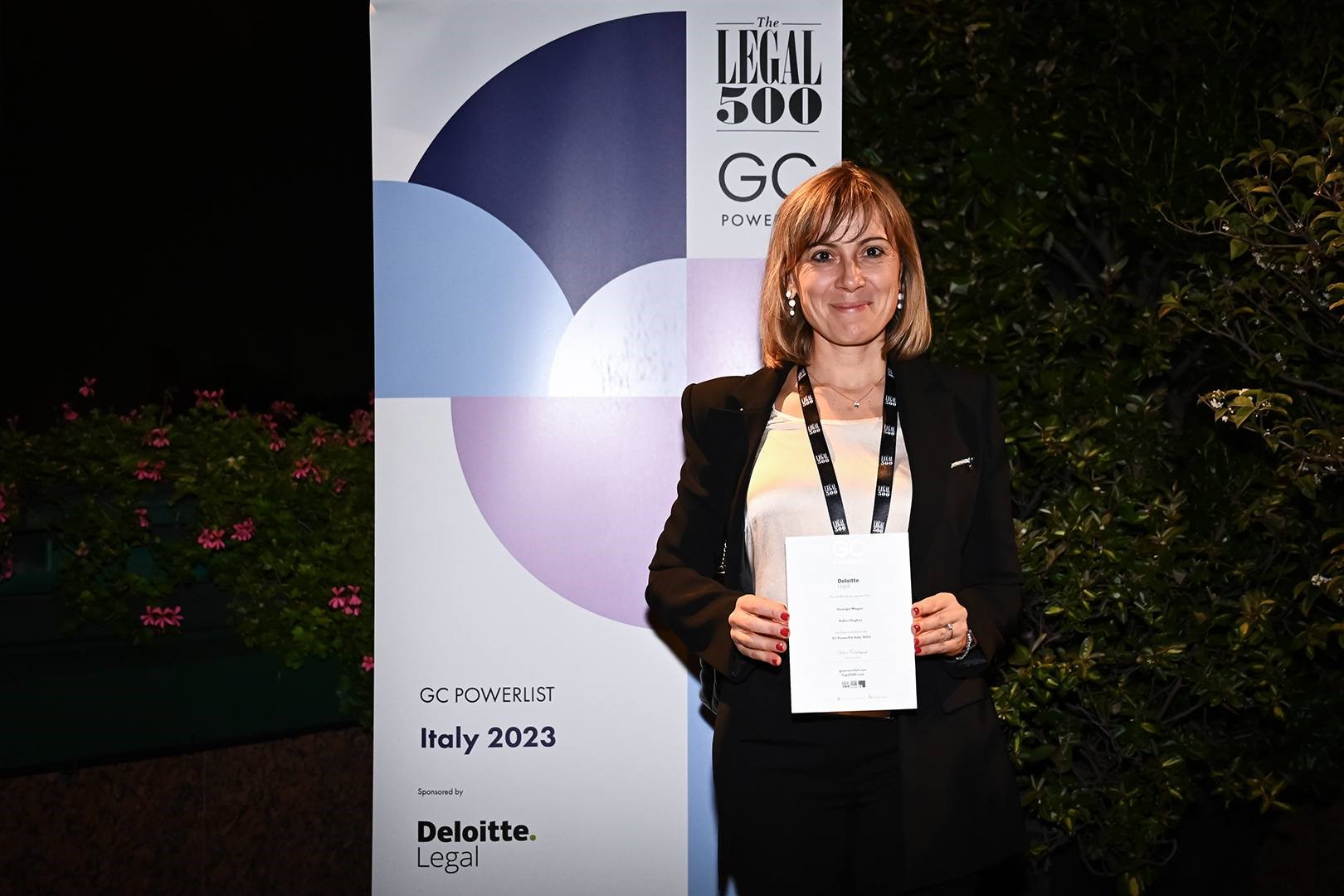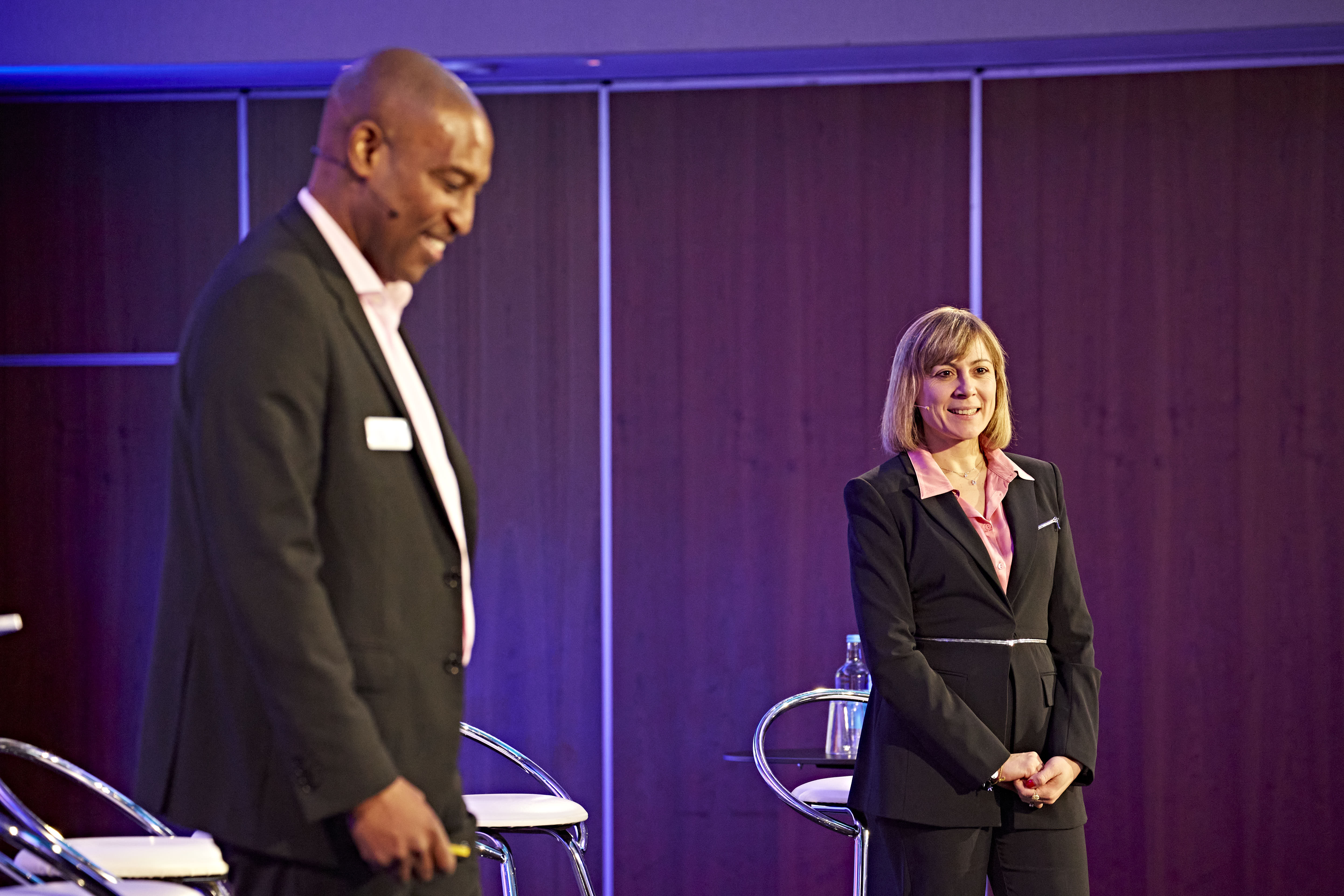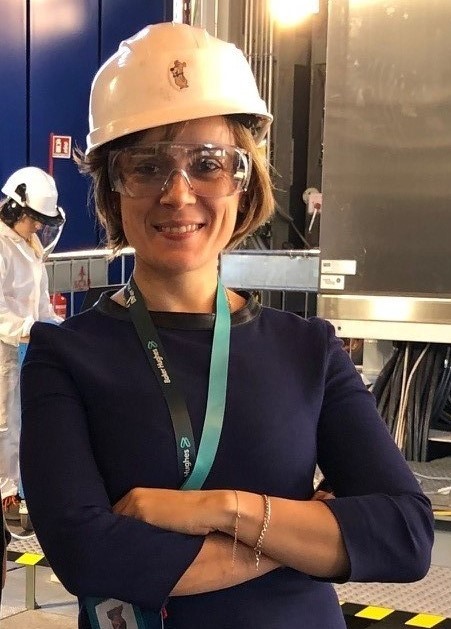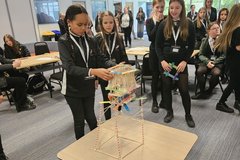Straight-talking lawyer Georgia Magno brings a sharp mind, an open heart, and a passion for being part of the business strategy to her role as the new Baker Hughes Chief Legal Officer.
Question:
Congratulations on becoming Chief Legal Officer. Could you share with us how you came to join the company in 2010?
GEORGIA MAGNO:
I’d decided to leave the corporate-law-firm world for a couple of reasons. I wanted to go back to Italy to start a family and the opportunity to join the company (it was GE Oil & Gas then) in Florence opened up. When you’re external, you get involved in some of the most complicated issues but you’re always at the periphery of strategic decision making. Being in house allows you to start planning the strategy, especially for a company like ours. Historically and in some companies, lawyers are seen as the necessary evil: ‘We have all our strategy laid out and now we have to talk to the lawyer’. At Baker Hughes, the legal team is very much a part of the strategy and that’s very exciting. It allows you to work on planning growth, thinking about how we develop new products from a legal point of view. How you’re protecting our IP (Intellectual Property), getting into new markets, structuring relationships, negotiating complicated contractual arrangements.

Question:
How did you come to study law?
Georgia:
Even before I started school I would study my older brother’s books – studying was always a big part of who I am. When I finished high school in Italy, I didn’t really know what I wanted to do. For the longest time I wanted to be a naval engineer, which clearly, I didn't pursue. I grew up in the middle of nowhere – in the region of Abruzzo. I joke that when you’re naming the regions of Italy, Abruzzo is the one everyone forgets! It was a beautiful place to grow up, in a small town of 4000 people, surrounded by small towns. It’s very relaxed and safe and everyone knows everybody, yet somehow, I had this notion of joining a big company.
I participated in a mathematics competition and the winners of the regions were sent to Milan for the national final. There, they told us that we could apply to a very prestigious economics university, Bocconi University. I got in and I thought, ‘OK, this is it, I'm going to do economics’. We had to take two legal tests as part of our study, and I fell in love with the law. Most of my fellow students in economics hated the legal exams – they thought they were the most boring part of the first-year curriculum. For me, it was the best part, so I thought, ‘OK, maybe that's my calling’, and I transferred to law, moving to the University of Bologna, the oldest university and law school in the world.
Question:
Your previous job at Baker Hughes was leading the Legal team for the Industrial and Energy Technology (IET) business segment. Given the company's direction, that would seem to be a wonderful springboard to become Chief Legal Officer.
Georgia:
I would agree that it’s very helpful. It’s a business that has a strong heritage in our core business of oil and gas and it’s also the business that is very quickly moving towards a number of growth areas that we believe will define our future. The Climate Technology Solutions product line sits in the IET business segment, and I had the opportunity to work with them creating business models for our partnerships and the way we go about investments and equity in startups.
The other growth area is digital – we have a dedicated Industrial Solutions product line, and I was part of the team that created that. It focuses on a number of industries beyond oil and gas to provide digital solutions for asset-performance management and optimizing operations. We believe that new energies and digital will continue to grow and become a significant part of our revenue.
That previous role also prepared me well because it’s a very strong global business segment, with a very large footprint in Europe and the US and growing strongly in the Middle East. It’s also a business where we have historically managed very complex projects, and started moving towards projects where we take a part of the risk and play a role beyond selling equipment. That is more and more going to be our growth story: Baker Hughes doesn’t only sell equipment or services, but we also provide solutions and maybe share a part of the risk in managing the assets long term and providing outcome-based solutions.

Question:
You pride yourself on being a leader as well as a lawyer - how do you develop people in your team to become leaders?
Georgia:
I am a people person and I take the most joy from working with other people. A key part of my role is not only to address legal issues but to make sure that we have a team that can do that. My developing leaders is just as important as my being a good lawyer. I’m most proud of the team I created in IET because there are so many rock stars in it. They are not only very good at what they do legally, they understand the business direction and partner with the business to enable growth. They also have the strength to say, ‘We cannot do this, this is where we draw the line’, but then offer the solution, ‘We can get it done this way’.
That is true leadership, it’s not just about understanding the legal issues but also about being a part of the business and helping to set the strategy, the growth, and the culture of the organization. You also need to work with customers, often negotiating on very complex contracts. The ability to get to yes is a really powerful skill in a senior lawyer – it’s no less important than understanding the legal issues themselves. Being a trusted partner in the business and having practical knowledge and solutions means that when these lawyers say ‘no’, people will respect that.
In the Legal and Compliance team, we’re also friends – there’s a lot of collaboration, sharing and helping each other. One of our colleagues was expecting a promotion that was delayed because the person had to work on their executive presence. Another member of the team went out of her way to help her colleague. She’d prep with this colleague, did dry runs and sent ideas. She made herself a coach – I didn’t know anything about it. A few months later upon getting the promotion, my colleague told me that all about the support provided by the team. That level of camaraderie is priceless. Good people are committed to the company and to each other.
Question:
What is your approach to navigating ESG (Environmental, Social and Governance) goals?
Georgia:
For me, it’s important to know that we have a strategy for energy transition that we believe in and that we are pursuing not because it’s flavor of the month but because it’s a key cornerstone for our existing portfolio and the portfolio we’re developing.
We believe we have an important role to play in decarbonizing the industry and in helping people and the planet in a principled way. It’s important that we stay out of some of the ‘trends’ and be consistent. We are a company that has a tremendous history of creating groundbreaking technologies and solutions and we can apply that to advance decarbonization and the energy transition. The science is clear that we need to make the transition, and we can do that in a way that is ethical and profitable from a business point of view, which is obviously an obligation we continue to honor. It’s also a strategy that engages people to be very excited to work with us. We are a company that is both winning in the marketplace and is on the right side of history.

Question:
What about AI and your profession?
Georgia:
There’s been a lot of talk about AI eliminating lawyers’ jobs and that makes me smile because, yes, maybe some low-level, low-complexity legal tasks will be taken over by AI, but there will be so many legal issues posed by AI that lawyers will be incredibly busy! There will be a lot of litigation around AI – from privacy to copyright to trademarks. New areas of the law will emerge to address AI and I find that fascinating.
Technology moves fast. We must control it and we must understand the risks, but we also need to seize the opportunities and I see a lot for the legal department in applying AI. One of the first things I did in my new role was to add AI specific goals to my objectives for the legal department in 2024. I would like to roll out some AI technology in our department to make our work more efficient and devote our lawyer brains to more complex legal issues. We’re starting to work with some providers to test some of the tools available. Obviously, they have to be tools that protect our IP and have not been developed in violation of someone else’s IP.
I’m fascinated by technology and typically it is impossible to stop. It’s a matter of building a space for a very strong river to be able to calm down, instead of it hitting you. You must control it and manage it.
Question:
You are a former enterprise leader for the Baker Hughes Women's Network. How do you thing the company is doing on improving DEI (Diversity, Equity and Inclusion)?
Georgia:
The company has made it a very open objective – there’s been tremendous progress with measuring and reporting externally and an obvious shift in the way people focus on it and talk about it. Diversity brings diversity. We have more diverse talents in the pipeline and more diverse talents being promoted to critical roles. We’re on a great journey.
There are many angles to diversity, and we don’t give ourselves enough credit for how diverse from a cultural point of view our employee population is. We have people from hundreds of different countries working together across all levels of the company. Our leadership team would probably cover all the continents of the globe – we’re all from different places. Maybe we assume that a multicultural leadership team is normal, but it’s not. In many companies, the leadership team would markedly be made up with people from the country where the company is from.
Something I started doing when I was leading the Women’s Network and want to do again is actively talking to more people all through the company. There are 52 weeks in the calendar, I want to make one hour each week to speak with two of our top talents from around the world. It’s absolutely doable. Let’s hear what they think, learn how they would promote diversity from their point of view and start bringing their ideas in. We don’t do that enough at the grassroots level. I want to hear, for example, from a female leader working on a rig in Kazakhstan. I've got no idea how you feel, what works for you and what doesn’t? Tell me about your culture and if you had my role, what would you do? It’s as simple as an hour a week, and you get to motivate and involve talented people, learn a lot, cross-pollinate, and come up with remarkable ideas.
Question:
You came home to Italy to start a family and your sons Davide and Luca are now 7 and 5 years old. How did becoming a mother change you?
Georgia:
First, it obviously changed my entire priorities. But for me study or work has never been transactional – I have to love what I do, and I have to believe it makes a difference, that there’s a purpose to it. I’m not crazy enough to think that I’m changing the world, but neither do I want to work X many hours a day to do something that is completely irrelevant, and I do think that that has been reinforced big time by becoming a mother.
I want my children to have a world that they can thrive in, that is safe, fair, and free and not a living hell because of climate change. I also want to be proud when I tell them how I’ve used my life. I want them to know it’s not just about earning money. Are you working with people you care about and trust? Are you learning? Is it exciting most of the time? I pay a lot more attention to all that since becoming a mother. I am at a point in my career where if I didn’t have a purpose in my job, I would go and do something else.
Question:
You say you love to work with fearless, fun people...
Georgia:
My husband makes fun of me because I come home from work or from an off-site and say, ‘Oh it was such a blast!’. I like witty, smart people who make me laugh and I also find they are people who get a lot done and have lots of new ideas.
I would really like to encourage people to appreciate the importance of other people and building communities at work. I think sometimes people don’t appreciate how important it is to build relationships at work, and not just the selfish piece about getting things done faster because you know who to call – that is true, but it’s a side effect. To me, it’s important to build relationships because how else would we endure the pressure, complexity, and long hours without also being friends.
Question:
Could you tell us about some work that you're very proud of?
Georgia:
One thing that I’m proud of is I came up with the idea of horizontal practice groups in the legal team. We did it in energy transition, digital and commercial and in some other parts of the business. I picked a diverse group of leaders, and we had 100 people apply to be a part of the practice groups. The beauty of it was that it was voluntary collaboration, no forced moving people around, reporting, creating a CoE (Center of Excellence) – all the things that typically alienate people. It was saying, ‘Why don’t you go horizontal by working together?’ and people joined if they wanted to.
Those teams came up with priorities – which were true priorities, not ones they’d been told were priorities – and they have since issued dozens of new things … new training modules for energy transition technologies, new terms and conditions and MoU (Memorandum of Understanding) templates, rather than reinventing the wheel all the time. Now those templates and training modules are being used all the time, all kept in one place.
When I asked them what they liked about it they said the best part was getting to know people they had never worked with, from other parts of the world or a different part of the company. ‘Now we’ve worked together, developed this template together – we’re like friends for life.’ Maybe we don’t take enough time to do things like that. The first one was 2022, we did it again last year and now we will do practice groups 3.0, the third year. It was also a great way for the chosen leaders to show their influence and engage the pool of people who’d volunteered.
I didn’t do anything other than pick the leaders and have the idea. It was very simple and very successful, with no costs or forced organization, just people getting busy. I call it ‘crowd lawyering’ because they all came together and came up with ideas and agreed on the priorities. It worked because people needed it and cared about it and now it’s their work product, so they’re very attached to it! It didn't require a lot, but it just worked so beautifully.
Energy Forward Stories
Sign up to stay up to date on the latest innovations and people shaping the future of our industry.




